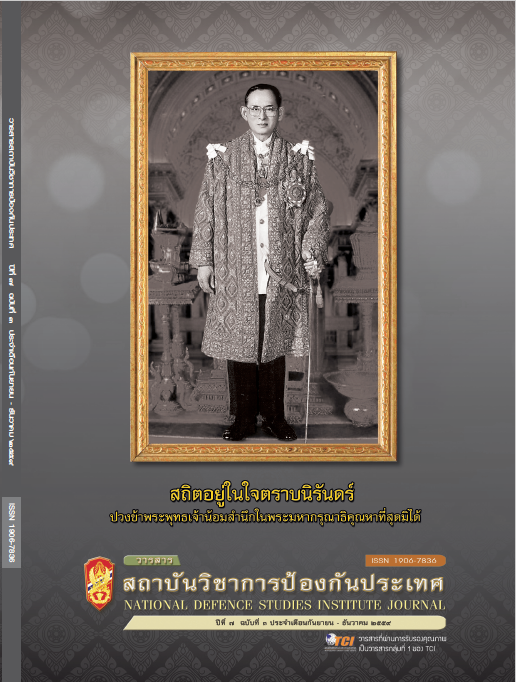ความสัมพันธ์ระหว่างอำนาจกับการคอร์รัปชั่น กรณีศึกษาการกู้เงินของภาคธุรกิจเอกชน
Main Article Content
Abstract
บทคัดย่อ
การวิจัยครั้งนี้มีวัตถุประสงค์ 1) เพื่อศึกษาถึงกระบวนการผลิตสร้างอำนาจในมิติต่าง ๆ ที่เกี่ยวกับการคอร์รัปชั่นโดยให้ความสำคัญกับความรู้ 2) เพื่อศึกษาการใช้อำนาจ/ความรู้ ดำเนินการบริหารจัดการที่เป็นสาเหตุให้มีการใช้อำนาจนั้นเป็นเครื่องมือ หรือช่องทางทำการคอร์รัปชั่น และ 3) เพื่อเสนอแนะมาตรการป้องกันและปราบปรามการคอร์รัปชั่น การวิจัยนี้เป็นการวิจัยเชิงคุณภาพแบบผสมผสาน เครื่องมือที่สำคัญในการวิจัยประกอบด้วย การค้นคว้าข้อมูลจากเอกสาร คำพิพากษาของศาลฎีกาแผนกคดีอาญาของผู้ดำรงตำแหน่งทางการเมือง เมื่อวันที่ 26 สิงหาคม พ.ศ.2558 คดีหมายเลขแดงที่ อม.55/2558 การสัมภาษณ์เจาะลึกบุคคลผู้ทรงคุณวุฒิ โดยมีการวิเคราะห์ อธิบาย ด้วยทฤษฎีคอร์รัปชั่น แนววิเคราะห์สาเหตุปัจจัยนำไปสู่คอร์รัปชั่น ทฤษฎีที่เกี่ยวข้องกับอำนาจ อำนาจการเมืองกับการปกครอง เศรษฐศาสตร์การเมือง เศรษฐศาสตร์ว่าด้วยอำนาจ อำนาจเศรษฐกิจระบบทุนนิยม และ ทฤษฎีเครือข่ายอำนาจ
ผลการวิจัยพบว่า 1) คอร์รัปชั่นเกิดขึ้นได้ ต้องมีอำนาจ หรือมีการครองอำนาจ โดยที่ผู้ใช้อำนาจนั้นมุ่งเน้นประโยชน์ส่วนตนและพวกพ้อง โดยการอาศัยตำแหน่งหน้าที่ กฎหมาย ความสัมพันธ์ส่วนตัว ข่าวสารข้อมูลวงในและการเลือกปฏิบัติ แต่กระบวนการคอร์รัปชั่นจะยังไม่เกิดขึ้น จนกว่าจะเกิดมีชุดความรู้ และชุดความรู้นี้ ก็จะกลายมาเป็นพื้นฐานของการใช้อำนาจนั้น การคอร์รัปชั่นจะมีผล หรือพลังมากพอ ต้องร่วมมือกันเป็นเครือข่าย ที่ทุกฝ่ายได้ผลประโยชน์จากเครือข่าย คอร์รัปชั่นเกิดขึ้นได้ ต้องมีความสัมพันธ์ ของอำนาจ ความรู้และเครือข่ายอำนาจ ซึ่งกันและกัน 2) การวิเคราะห์ความสัมพันธ์ระหว่าง อำนาจและคอร์รัปชั่นต้องใช้หลากหลาย แนวคิดทฤษฎี ในการวิเคราะห์ ที่เป็นสหวิทยาการ การอธิบาย คอร์รัปชั่นมีลักษณะที่ไม่แยกส่วน เพราะการคอร์รัปชั่นมาจากปัจจัยหลายอย่างรวมกัน และไม่เหมือนกัน 3) การจะแก้ปัญหาคอร์รัปชั่นได้ ต้องทำทั้งระบบ เพราะคอร์รัปชั่นเป็นผลผลิตของระบบ ระบบคือคอร์รัปชั่น 4) ได้ความหมายของ Governmentality ศิลปะการปกครอง หมายถึง ศิลปะการใช้อำนาจ เพื่อการบริหารจัดการระบบให้ไปในทิศทางคอร์รัปชั่น
คำสำคัญ: อำนาจ, คอร์รัปชั่น
Abstract
This research had the goals of 1) studying the process of producing power in various dimensions concerning corruption, stressing knowledge, 2) studying the use of power/knowledge as tools for corruption and 3) making recommendations for preventing and prosecuting corruption. This research is a mixed qualitative study. The important tool in the research include the examination of documents, judgments of the Criminal Division for Holders of Political Positions of the Supreme Court, Case No. red 55/2558 on August 26,2015 and the in-depth interviews with qualified personnel. This research was analyzed with the theory of corruption and analytical methods of the causes of corruption, sociological, political economic and political administration theory, economics of power, capitalist economic power and power network theory.
The result of the research shown that 1) Power and power to govern is the cause of corruption because the person possesses the power focus on their own benefit and allies, by making use of their positions, power of law, personal relationship, inside information and double standard. Normally the starting point is power, and knowledge is created in support of that power. In addition, the corrupt will be effective when done together as a network. That everyone benefits. 2) Analysis of the relationship between power and corruption requires the interdisciplinary use of a variety of concepts and analytical theories. The explanation of corruption must consider the complete picture, because corruption comes from many factors together, and these may be different in each person. 3) The cure for corruption involves the entire system, because corruption is a product of the system. The system is corruption. 4) This case study demonstrates the meaning of governmentality, the administrative art which its meaning is the art of using power to manage a system to take it towards corruption.
Keywords: power, corruption
Article Details
The articles, images, tables, graphs, written content, and opinions published in this journal are solely those of the authors and do not necessarily reflect the views or positions of the National Defence Studies Institute or its academic affiliates.


